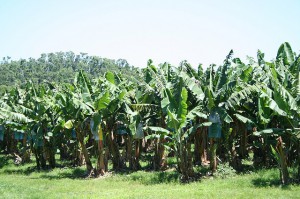High levels of pesticide exposure in pregnant women in Costa Rica
A recent study published in Environmental Health Perspectives has found high levels of the fungicide mancozeb in pregnant women living near banana plantations in Costa Rica. Mancozeb is aerially applied to bananas grown primarily for export to the United States in order to prevent fungal diseases. While mancozeb has relatively low toxicity to humans, there is concern that it may interfere with fetal brain development when the fetus is exposed to the chemical by route of the mother. For the study, 451 pregnant women living within 5 km (about 3 miles) of a banana plantation agreed to be interviewed and submitted urine, blood and hair samples for testing. Almost 75 percent of the women participating had an estimated daily intake of mancozeb higher than the limit for chronic oral exposure set by the U.S. Environmental Protection Agency. Women living in close proximity to banana plantations had the highest levels of metabolites of mancozeb. The researchers concluded that current regulations governing aerial pesticide spraying activities do not protect pregnant women and fetuses from exposure.



